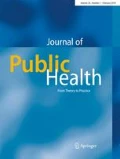Abstract
Aim
Promoting mental health and preventing ill mental health are worldwide concerns, with many personal and societal implications. While there are different initiatives to reduce stigma and discrimination, and prevent and treat mental health, the initiatives appear to fall short. This short communication situates the problems around mental health, after and during higher education years, and reviews Mental Health First Aid Training and its potential in university contexts through peer support schemes.
Subjects and methods
Literature on (1) Mental Health First Aid Training and (2) peer support in higher education was explored separately and in association.
Results
Reviewing the literature revealed that the association between Mental Health First Aid Training and peer support did not exist in academic literature, deterring a potential interposition of greater public health.
Conclusion
The article describes a radical and innovative way to enhance mental health across cultures and societies and collectively through universities to impact mental health positively for current and future generations.
References
Armstrong G, Ironfield N, Kelly CM, Dart K, Arabena K, Bond K, Jorm AF (2017) Re-development of mental health first aid guidelines for supporting aboriginal and Torres Strait islanders who are engaging in non-suicidal self-injury. BMC Psyc 171:300
Bayram N, Bilgel N (2008) The prevalence and socio-demographic correlations of depression, anxiety and stress among a group of university students. Soc Psyc and Psyc Epid 43(8):667–672
Cage E, Stock M, Sharpington A, Pitman E, Batchelor R (2018) Barriers to accessing support for mental health issues at university. Stud HE: 1–13
Chinman MJ, Weingarten R, Stayner D, Davidson L (2001) Chronicity reconsidered: improving person-environment fit through a consumer-run service. Com Men Hea J 37(3):215–229
Department of Health (2014) Annual Report of the Chief Medical Officer 2013: Public Mental Health Priorities: Investing in the Evidence. Retrieved from: www.gov.uk/government/publications/chief-medical-officer-cmoannual-report-public-mental-health [Accessed 18/10/18]
Eisenberg D, Hunt J, Speer N, Zivin K (2011) Mental health service utilization among college students in the United States. J Ner Men Dis 199(5):301–308
Equality Challenge Unit (2012) Equality in higher education: statistical report 2012. Retrieved from: https://www.ecu.ac.uk/publications/equality-in-he-stats-2012/ [Accessed 18/10/18]
Goldstrom ID, Campbell J, Rogers JA, Lambert DB, Blacklow B, Henderson MJ, Manderscheid RW (2006) National estimates for mental health mutual support groups, self-help organizations, and consumer-operated services. Adm Pol Men Hea Ser Res 33(1):92–103
Grant A (2011) The growth and development of mental health provision in UK higher education institutions. Universities UK/guild HE working Group for the Promotion
Hadlaczky G, Hökby S, Mkrtchian A, Carli V, Wasserman D (2014) Mental health first aid is an effective public health intervention for improving knowledge, attitudes, and behaviour: a meta-analysis. Int Rev Psy 26(4):467–475
Health and Safety Executive (2018) Labour force survey. Retrieved from: http://www.hse.gov.uk/statistics/sources.htm [Accessed 18/10/18]
Jorm AF, Kitchener BA (2010) Noting a landmark achievement: mental health first aid training reaches 1% of Australian adults. Aus N Zea J Psyc 45:808–813
Kitchener BA, Jorm AF (2008) Mental health first aid: an international programme for early intervention. Ear Int Psyc 2(1):55–61
Langlands RL, Jorm AF, Kelly CM, Kitchener BA (2008) First aid for depression: a Delphi consensus study with consumers, carers and clinicians. J Aff Dis 105(1–3):157–165
Morgan AJ, Reavley NJ, Ross A, San Too L, Jorm AF (2018) Interventions to reduce stigma towards people with severe mental illness: systematic review and meta-analysis. J Psy Res 103:120–133
National Academies of Sciences, Engineering, and Medicine (2016) Ending discrimination against people with mental and substance use disorders: the evidence for stigma change. National Academies Press
Office for National Statistics (2014) Full report: sickness absence in the labour market. Retrieved from: https://www.ons.gov.uk/employmentandlabourmarket/peopleinwork/labourproductivity/articles/sicknessabsenceinthelabourmarket/2014-02-25 [Accessed 18/10/18]
Rückert HW (2015) Students’ mental health and psychological counselling in Europe. Men Hea and Prev 3:34–40
Slade T, Johnston A, Oakley Browne MA, Andrews G, Whiteford H (2009) 2007 National Survey of mental health and wellbeing: methods and key findings. Aus N Zea J Psyc 43(7):594–605
Storrie K, Ahern K, Tuckett A (2010) A systematic review: students with mental health problems—a growing problem. Int J Nur Pra 16(1):1–6
World Health Organization – WHO (2011) Global burden of mental disorders and the need for a comprehensive, coordinated response from health and social sectors at the country level: report by the secretariat. Retrieved from: www.who.int/gb/ebwha/pdf_files/EB130/B130_9-en.pdf [Accessed 18/10/18]
Author information
Authors and Affiliations
Corresponding author
Ethics declarations
Conflict of interest
The author declares that he has no conflict of interest.
Human participants and/or animals
This article does not contain any research involving human participants and/or animals.
Additional information
Publisher’s note
Springer Nature remains neutral with regard to jurisdictional claims in published maps and institutional affiliations.
Rights and permissions
About this article
Cite this article
Mantzios, M. Mental health first aid and exciting opportunities for peer-support networks within universities with prospects of influencing public health and treatment. J Public Health (Berl.) 28, 219–221 (2020). https://doi.org/10.1007/s10389-019-01057-5
Received:
Accepted:
Published:
Issue Date:
DOI: https://doi.org/10.1007/s10389-019-01057-5

